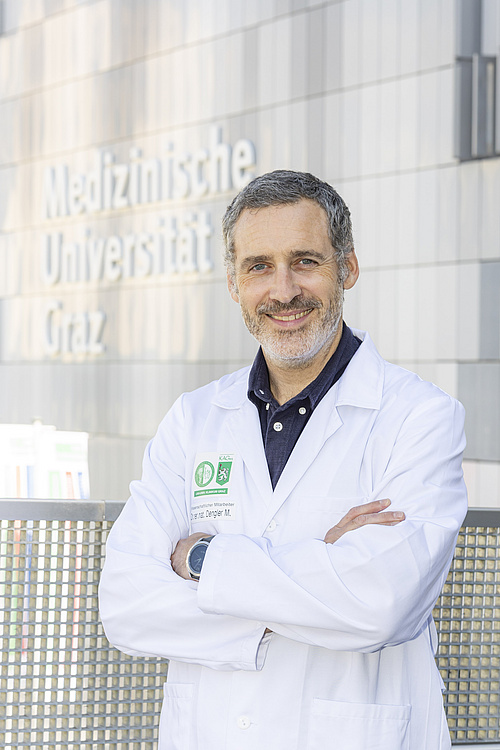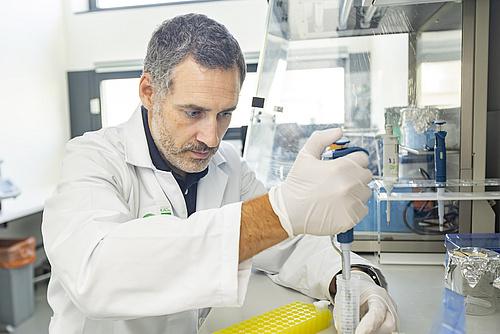-
The University
- Welcome
- Who we are
- Media & PR
- Studying
-
Research
- Profile
- Infrastructure
- Cooperations
- Services
-
Career
- Med Uni Graz as an Employer
- Educational Opportunities
- Work Environment
- Job openings
-
Diagnostics
- Patients
- Referring physicians
-
Health Topics
- Health Infrastructure

Lung cancer: influence of changes in blood
Lung cancer is one of the deadliest cancers worldwide. It is often discovered late—and although treatment options in oncology have improved, the survival rate is still low. Why many people have an increased susceptibility to cancer or respond less well to therapy remains one of the great open questions. One possible answer comes from an unexpected area: the blood. In the European research project SARAH, a Medical University of Graz team is investigating the relationship between genetic mutations in the hematopoietic system, so-called clonal hematopoiesis, and the development of lung cancer.
CHIP: When blood becomes a source of risk
As a person ages, changes in the genetic make-up of hematopoietic stem cells occur more frequently. They lead to clonal hematopoiesis of indeterminate potential (CHIP), a mostly unnoticed change in the blood that can increase the risk of leukemia as well as tumors such as lung cancer. The mechanisms behind it largely remain unclear, yet the international research team is pursuing a promising approach: "We suspect that CHIP-mutated blood cells produce pro-inflammatory mediators that favor tumor growth or weaken cancer treatment," explains Michael Dengler of the Division of Oncology, who is in charge of the project part at Med Uni Graz.
Precision, translation, innovation in molecular oncology
Med Uni Graz brings its internationally recognized expertise in molecular oncology and tumor immunology to bear in the SARAH project. Building on existing work to identify new molecular cancer drivers, the team follows a translational approach:
- The role of CHIP in lung cancer is being investigated using CRISPR/Cas9 gene editing, a biotechnology that changes DNA, and clinically relevant cancer models.
- In parallel, tissue samples from patients are analyzed in order to translate the findings to a clinical context.
- The aim is to establish new therapeutic approaches that specifically work for inflammation caused by CHIP while improving existing treatments.
"Our research shows that not only the tumor itself but also the hematopoietic system can influence cancer. When we better understand how blood cells mutated by CHIP interact with the tumor environment, new avenues will open up for personalized treatment strategies," explains Dengler.
From the cell to therapy
An important project goal is to identify new biomarkers that help detect high-risk patients as well as those who might respond particularly well to specific therapies. The research conducted at Med Uni Graz has led to a reduction in the time between molecular discovery and clinical application. "In the long term, our research findings might lead to completely new approaches to treatment. In addition to tumor therapy, doctors might also specifically treat the potentially dangerous CHIP mutations, make existing therapies more effective and thus improve the chance of survival for lung cancer patients," says Dengler. The clinical part of the project is supported by Philipp Jost, head of the Med Uni Graz Division of Oncology as well as Comprehensive Cancer Center Graz: "Especially in oncology, we need approaches that go beyond focusing on the tumor alone. The project presents an opportunity to better understand risk factors such as CHIP and then identify patients and provide them with therapy earlier on. Better personalized treatment strategies for lung cancer are coming within reach," adds Jost.
SARAH: International cancer research
The SARAH project is funded by the European research initiative TRANSCAN-3. The consortium was able to acquire EUR 1 million in total for the project; the funding for Med Uni Graz is around EUR 300,000. TRANSCAN-3 pools investments in key areas of cancer research in order to sustainably improve prevention, early detection, diagnosis, treatment and patient quality of life. The Graz team plays a key role in preclinical modeling and clinical validation. Researchers from University Hospital Schleswig-Holstein (UKSH), Germany, the University of Lübeck, Germany, and the Université de Montréal, Canada, are also involved in the project.
Profile: Michael Dengler
Michael Dengler is Tenure Track Professor of Functional Precision Oncology and Group Leader at the Division of Oncology of the Medical University of Graz. His research focus is molecular oncology. He works on understanding the molecular mechanisms of apoptosis and their deregulation in tumor cells. To research new therapeutic treatment strategies, Dengler and his team use the most modern lab techniques as well as different preclinical in vitro and in vivo cancer models.
More information
Ass.-Prof. Dr. rer. nat.
Michael Dengler
Michael Dengler
Division of Oncology
Medical University of Graz
T: +43 316 385 31428




